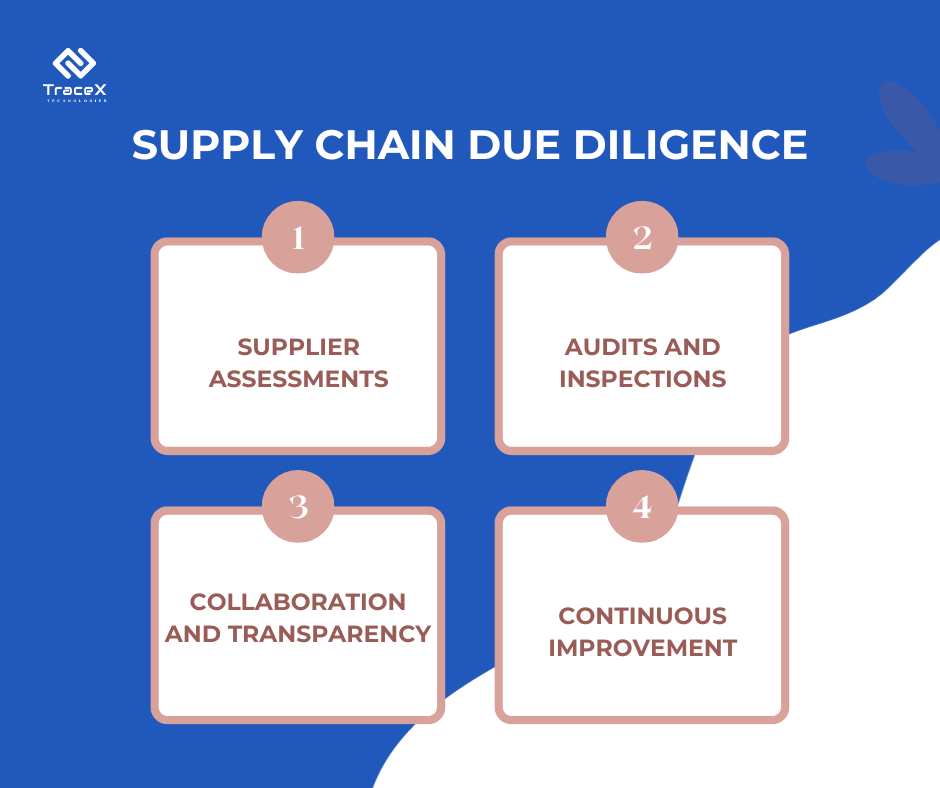Contact: +91 99725 24322 |
Menu
Menu
Quick summary: Navigate the complexities of supply chain due diligence with confidence! Our latest blog unveils the top 6 best practices for effective due diligence, offering actionable insights to fortify your supply chain resilience. Dive into a wealth of strategies that empower you to identify and mitigate risks, ensure compliance, and enhance sustainability. Elevate your supply chain management with these proven practices and stay ahead in an ever-evolving business landscape.

In today’s complex and interconnected business landscape, the concepts of supply chain transparency and due diligence have become paramount in ensuring ethical practices, environmental responsibility, and stakeholder trust. Supply chain transparency is crucial for businesses to trace the origin of products, ensure ethical practices, and meet consumer demands for accountability. It fosters trust, reduces risks, and promotes sustainability.
Due diligence plays a pivotal role in preventing the use of deforested products by scrutinizing suppliers and sourcing practices. This proactive approach helps companies avoid environmental harm, legal complications, and safeguards their reputation. It aligns with global efforts towards responsible and sustainable supply chain management.
Sustainability risks are on the rise in global supply chains, reaching unprecedented levels with a significant surge in modern slavery. Additionally, environmental impacts are anticipated to incur costs of $120 billion for global companies by 2026.
As global markets intertwine, consumers and regulators alike demand a clearer view into the intricate networks that deliver products to their hands. This blog delves into the crucial realms of supply chain transparency and due diligence, exploring why they are not just buzzwords but essential components for businesses navigating the path toward sustainability, accountability, and responsible corporate citizenship. Join us as we unravel the significance of transparency and due diligence in the supply chain, examining the challenges, solutions, and the transformative impact these practices can have on industries worldwide.
Supply chain due diligence involves a comprehensive examination and ongoing monitoring of suppliers, manufacturers, and distributors to guarantee adherence to legal, environmental, and ethical standards. Through diligent assessments, businesses can proactively manage risks, safeguard their reputation, and actively contribute to fostering a sustainable future.
Ethical Sourcing – Through the implementation of due diligence, companies can verify that their suppliers uphold fair labor practices, human rights, and environmental regulations. This proactive approach serves to prevent the exploitation of workers and actively promotes social justice.
Risk Management– Conducting due diligence in the supply chain aids in identifying potential risks like child labor, corruption, or unsafe working conditions. Through proactive risk mitigation, companies can steer clear of legal complications, protect their reputation, and avoid financial losses.
Environmental Impact- Evaluating the environmental practices of suppliers enables companies to pinpoint potential risks and actively strive to minimize their carbon footprint. Through collaboration with environmentally conscious suppliers, businesses can play a role in fostering a more sustainable and environmentally friendly future.
Consumer Trust- In the present day, consumers are growing more mindful of the products they buy. Establishing a transparent and responsible supply chain allows companies to cultivate trust, loyalty, and a favorable brand image among their customer base.
Supply-chain due diligence has emerged as a crucial strategy for global trade professionals to mitigate risks, ensure regulatory compliance, enhance resiliency, and safeguard against brand damage arising from increasingly vigilant and supply-chain-aware customers and activists.
However, executing effective due diligence in a complex supply chain is a challenging endeavor. It demands a considerable investment of time, dedication, expertise, and technology. Moreover, when conducted correctly, it is not a sporadic check-in but an ongoing, continually evolving practice. The landscape of supply-chain due diligence is also rapidly transforming due to escalating pressures to comprehend the intricacies of every layer and stage of the supply chain.
In the current business landscape, every company faces the delicate task of navigating growth, ensuring the resilience of their supply chains, and addressing Environmental, Social, and Governance (ESG) risks and performance. Serving as the crucial link between internal departments and indispensable suppliers, the supply chain function plays a pivotal role in achieving this delicate balance. The urgency of these challenges has heightened, given the swift proliferation of laws mandating supply chain due diligence.
Globally, countries are enacting new legislation and directives necessitating companies to evaluate their suppliers’ environmental and human rights practices. These regulations are predominantly inspired by the Organization for Economic Cooperation and Development (OECD) Due Diligence Guidance for Responsible Business Conduct, first published in 2018. Numerous European nations have already implemented legislation in line with OECD guidance, exemplified by Germany’s Supply Chain Due Diligence Act and France’s Corporate Duty of Vigilance Law. While these laws broadly encompass all product categories, the United States has introduced the Uyghur Forced Labor Prevention Act, specifically compelling companies importing cotton products from China’s Xinjiang region to conduct due diligence and verify that the goods were not produced through forced labor.
Canada has proposed the Corporate Respect for Human Rights and the Environment Abroad Act, and Japan has formulated the Guidelines on Corporate Human Rights Due Diligence.
In June 2023, the European Union Parliament sanctioned the Corporate Sustainability Due Diligence Directive (CSDDD), imposing more stringent due diligence requirements on companies based in the EU or operating within its borders. The EU is at the forefront of addressing deforestation through its proposed EU Deforestation regulations (EUDR). The legislation aims to tackle the impact of products associated with deforestation on the EU market.
With the expanding array of regulations related to supply chain due diligence, companies face escalating demands to guarantee adherence to human rights and environmental regulations. To steer clear of sanctions and financial penalties, procurement teams must prioritize transparency within the supply chain. Effectual due diligence hinges on visibility, transparency, and knowledge, yet these elements also stand as the most formidable challenges for supply-chain professionals.
Establishing transparency within your supply chain requires a comprehensive understanding of its structure and the involved stakeholders. This extends throughout the entire supply chain, surpassing direct contractual relationships. Transparency is a fundamental requirement for implementing due diligence. Only by having a clear knowledge of where, how, and by whom your products are manufactured can you effectively take specific actions to mitigate social, environmental, and corruption risks within your supply chain. This understanding allows for the reduction of negative impacts and, if necessary, the implementation of corrective measures and compensation.
Reporting standards, like the Global Reporting Initiative (GRI) and Sustainability Accounting Standards Board (SASB), provide frameworks for companies to disclose their environmental, social, and governance (ESG) performance, fostering standardized and comparable reporting. These standards guide companies in communicating their efforts toward sustainable and ethical practices, contributing to a more accountable and responsible business landscape.
Navigating the complexities of supply chain due diligence requires a comprehensive understanding of your suppliers, their processes, and the ability to collect, track, and connect data at every stage. Additionally, it entails leveraging procurement influence to steer suppliers towards sustainable practices.
Identify critical suppliers for your business and assess their risks, considering factors such as financial stability, corporate governance, sustainable practices, and operational efficiency.
Develop a systematic process for conducting due diligence on suppliers. This includes defining the scope of reviews, determining the information to be collected, and establishing criteria for evaluating each supplier. Establish a regular cadence for these assessments.
Actively engage with suppliers to comprehend their operations, business practices, priorities, and potential risks that might affect your sourcing relationship. Foster open communication channels.
Implement an ongoing monitoring process to ensure that suppliers consistently meet the company’s standards. Utilize a mix of education, resources, incentives, encouragement, and potential penalties to foster cooperation and compliance.
Work collaboratively with internal and external stakeholders, including third-party standards organizations, regulators, and NGOs. This collaboration is crucial for understanding and implementing best practices in supply chain due diligence.
Develop contingency plans and a proactive supply chain risk management process to address unforeseen disruptions or other risks that may impact the supply chain. Recognize that supply chain sustainability is a long-term, strategic business process. Regularly review and assess the effectiveness of your supply chain due diligence process, making continuous improvements as needed to adapt to evolving challenges and opportunities.

Technology significantly enhances supply chain transparency by providing real-time visibility, traceability, and data accuracy. Automation, IoT devices, and advanced analytics contribute to more efficient and accountable supply chain management.
Blockchain stands out among digital tools for traceability, offering an immutable and decentralized ledger for recording transactions. It ensures transparency by enabling stakeholders to access a secure and unalterable record of the entire supply chain. Other digital tools, such as RFID tags and QR codes, facilitate seamless tracking of products, allowing consumers to access detailed information about the product’s journey.
Innovations in supply chain monitoring include AI-powered predictive analytics, which forecast potential disruptions, and satellite technology for real-time environmental monitoring. These advancements provide companies with valuable insights, enabling proactive decision-making and risk mitigation. Overall, ongoing technological developments continue to revolutionize supply chain transparency, promoting sustainability and responsible business practices.
TraceX, with its powerful blockchain-powered traceability solutions, emerges as a game-changer, empowering companies to overcome due diligence challenges.
TraceX tracks every step of a product’s journey, from raw materials to finished goods, providing unparalleled transparency throughout the supply chain. This eliminates hidden suppliers and opaqueness, enabling companies to confidently assess the practices of all players involved. Blockchain technology ensures data integrity and prevents tampering, providing reliable and verifiable information about supplier activities, certifications, and compliance practices. Accessing real-time data on production, labor practices, and environmental impacts empowers companies to proactively identify and address potential risks, making due diligence a continuous process, not just a one-time effort.
TraceX automates data collection through sensors and mobile apps, eliminating manual paperwork and reducing the time and resources needed for due diligence activities. By centralizing and securing data on a blockchain, TraceX eliminates the need for multiple databases and complex data management systems, saving companies time and resources.
Early detection of potential issues like unethical labor practices, environmental violations, or product safety concerns allows companies to take timely corrective actions and mitigate reputational damage. With clear visibility into supplier activities, companies can focus their due diligence efforts on high-risk suppliers or suspicious behavior, optimizing resource allocation and effectiveness. Blockchain’s data immutability strengthens transparency during crisis situations, providing a clear audit trail and facilitating investigations into product recalls or ethical concerns.
TraceX allows consumers to access verified information about product origins, sustainability practices, and ethical sourcing, building trust and loyalty for brands committed to responsible supply chains. Transparent and demonstrably responsible practices through TraceX due diligence solutions attract conscious investors and enhance a company’s ESG (Environmental, Social, and Governance) profile.
In conclusion, the landscape of supply chain transparency and due diligence is evolving rapidly, driven by technological advancements, shifting regulatory frameworks, and an increasingly informed and conscientious consumer base. Companies face challenges, but also opportunities, in adopting innovative technologies like blockchain and AI to enhance visibility and mitigate risks. Anticipated developments in regulatory frameworks signal a global commitment to enforcing responsible business practices. The crucial role of consumers in demanding transparency is reshaping industry norms and encouraging businesses to prioritize ethical and sustainable sourcing. As we move forward, the collaboration between technology, regulation, and consumer advocacy will be pivotal in fostering a more transparent, accountable, and socially responsible global supply chain.
